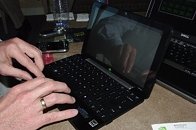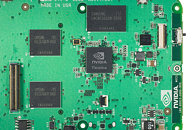- Joined
- Oct 9, 2007
- Messages
- 47,853 (7.38/day)
- Location
- Dublin, Ireland
| System Name | RBMK-1000 |
|---|---|
| Processor | AMD Ryzen 7 5700G |
| Motherboard | Gigabyte B550 AORUS Elite V2 |
| Cooling | DeepCool Gammax L240 V2 |
| Memory | 2x 16GB DDR4-3200 |
| Video Card(s) | Galax RTX 4070 Ti EX |
| Storage | Samsung 990 1TB |
| Display(s) | BenQ 1440p 60 Hz 27-inch |
| Case | Corsair Carbide 100R |
| Audio Device(s) | ASUS SupremeFX S1220A |
| Power Supply | Cooler Master MWE Gold 650W |
| Mouse | ASUS ROG Strix Impact |
| Keyboard | Gamdias Hermes E2 |
| Software | Windows 11 Pro |
It looks like NVIDIA's attempts to let Tegra make it to bigger platforms are beginning to bear fruit. LaptopMag got its hands on one of the first mini-notebooks based on Tegra, a fully-integrated computing architecture that focuses on making more powerful and visual portable computing devices possible. The Tegra CPU core is based on the ARM11 architecture, working along with NVIDIA's own graphics processing, and system controlling technologies.
The model in use with the mini-notebook is Tegra 650, which runs at 750 MHz (core clock speed), supports hardware HD video decoding, an S-Video out, and USB. It supports DDR memory running at 200 MHz, and an IDE channel for a sold-state drive for primary storage. Apart from the IDE interface, Tegra has its own NAND-flash controller so small amounts of flash memory (up to 8 GB) could be embedded onto the main PCB. The mini-notebook features an OS that lets the user achieve all the tasks one would ask from this 90~200 Dollar mini-notebook. Windows CE and Linux are the likely candidates. The screenshot below is that of the Windows CE-based prototype that takes advantage of the 3D processing power of the core. Also pictured is the prototype system board by NVIDIA.



View at TechPowerUp Main Site
The model in use with the mini-notebook is Tegra 650, which runs at 750 MHz (core clock speed), supports hardware HD video decoding, an S-Video out, and USB. It supports DDR memory running at 200 MHz, and an IDE channel for a sold-state drive for primary storage. Apart from the IDE interface, Tegra has its own NAND-flash controller so small amounts of flash memory (up to 8 GB) could be embedded onto the main PCB. The mini-notebook features an OS that lets the user achieve all the tasks one would ask from this 90~200 Dollar mini-notebook. Windows CE and Linux are the likely candidates. The screenshot below is that of the Windows CE-based prototype that takes advantage of the 3D processing power of the core. Also pictured is the prototype system board by NVIDIA.



View at TechPowerUp Main Site









